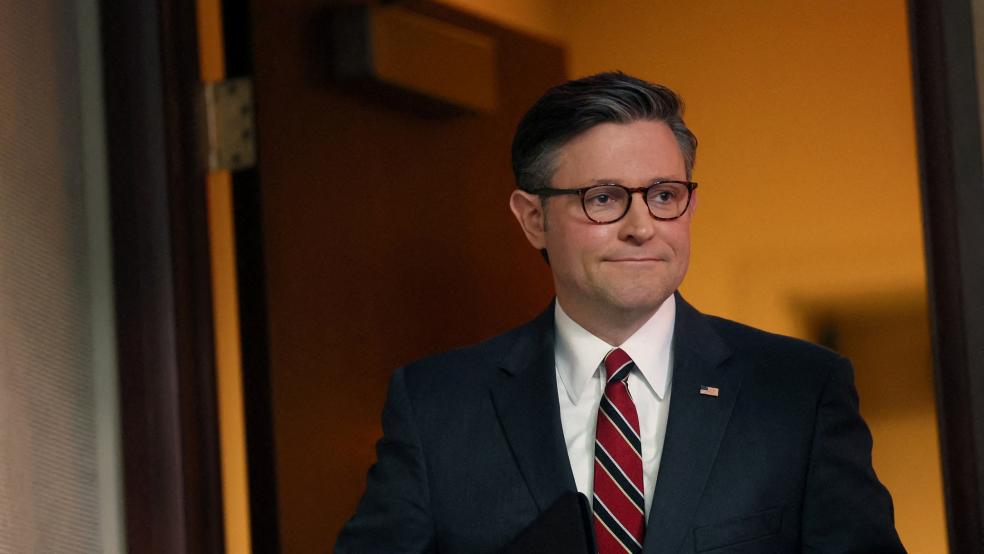With funding for portions of the U.S. government set to run out Friday at midnight, President Joe Biden has summoned Speaker Mike Johnson and the three other top congressional leaders to meet tomorrow for what the White House says will be a discussion about the “urgency” of passing aid to Ukraine and Israel and avoiding a government shutdown.
The urgency has only increased after appropriators who had hoped to announce a spending deal on Sunday instead saw their progress stall out as House Republicans continue to push for policy riders that Democrats see as poison pills. (See more details about the policy disputes here.)
Funding for the Departments of Transportation, Housing and Urban Development, Agriculture and Veterans Affairs — roughly 20% of the government, according to The Washington Post — is set to expire Friday night. The rest of the government faces a deadline one week later.
“It is my sincere hope that in the face of a disruptive shutdown that would hurt our economy and make American families less safe, Speaker Johnson will step up to once again buck the extremists in his caucus and do the right thing,” Senate Majority Leader Chuck Schumer wrote in a letter to senators Sunday. “While we had hoped to have legislation ready this weekend that would give ample time for members to review the text, it is clear now that House Republicans need more time to sort themselves out.”
Johnson fired back, saying that Republicans are trying to “rein in Democrats’ overspending” and that many of the issues that remain unresolved stem from new Democratic demands.
“At a time of divided government, Senate Democrats are attempting at this late stage to spend on priorities that are farther left than what their chamber agreed upon,” the speaker said in a statement. “This is not a time for petty politics. House Republicans will continue to work in good faith and hope to reach an outcome as soon as possible, even as we continue to insist that our own border security must be addressed immediately.”
Johnson must wrangle a Republican conference that continues to be deeply divided. Still, Senate Minority Leader Mitch McConnell, a Kentucky Republican, told reporters Monday that a shutdown is “entirely avoidable” if the House and Senate can come together. “We’re not going to allow the government to shut down,” he said.
Why it matters: “Even a partial shutdown would trouble federal food assistance programs — including WIC, an emergency nutrition program for women, infants and children that is already contending with a budget shortfall,” the Post’s Jacob Bogage reports. “Air traffic controllers would remain on the job, but would go unpaid. Federal housing vouchers, which support 5 million families, could be temporarily endangered. Government scientists would stop tracing and studying animal-borne diseases.”
Pressure on Johnson: As we’ve noted before, Johnson has some big decisions to make. Hardline House conservatives have been pressuring the relatively inexperienced speaker to pursue steeper cuts or Republican policy priorities in the spending talks. Those far-right members have made clear that they would be willing to see the government shut down to fight for their agenda and, absent policy wins, they would prefer a year-long stopgap funding bill that would trigger across-the-board spending cuts.
But the speaker also must weigh his party’s electoral priorities and the potential election-year repercussions of a government shutdown for Republicans’ narrow House majority. In a conference call with his members on Friday night, Johnson warned that the spending bills being negotiated might disappoint conservatives who were pressing for big policy wins.
“If you’re expecting a lot of home runs and grand slams here, I admit you’ll be disappointed,” Johnson reportedly said. “But we will be able to secure a number of policy victories, both in bill text and report language, or other provisions and cuts that severely undermine the [Biden] administration’s programs and objectives. These bills will be littered with singles and doubles that we should be proud of, especially in our small majority.”
Aid for Ukraine also unresolved: Schumer, just back from a visit to Ukraine, also called on Johnson to allow a House floor vote on the $95.3 billion supplemental spending package passed by the Senate.
“I call on the Speaker to go to Ukraine and witness what we witnessed, because I believe it is virtually impossible for anyone with decency and goodwill to turn their back on Ukraine if they saw the horrors of that war with their own eyes,” he said in his statement. “It is my deep hope that Speaker Johnson recognizes the weight of history is on his shoulders, and he shuts out the political and self-motivated demands of Donald Trump and rises to the occasion to meet the moment.”
In televised interviews on Sunday, White House National Security Adviser Jake Sullivan also pressed Johnson to allow a vote. “This is one of those instances where one person can bend the course of history. Speaker Johnson, if he put this bill on the floor, would produce a strong bipartisan majority vote in favor of the aid to Ukraine,” Sullivan told ABC’s “This Week.”
The bottom line: Shutdown fears are on the rise. The outcome of the current spending impasse depends on Johnson and how he wants to deal with the pressure from the far right. The House isn’t officially back until Wednesday, leaving little time for action ahead of the Friday night deadline, but we may get some sense of Johnson’s position after tomorrow’s White House meeting.





